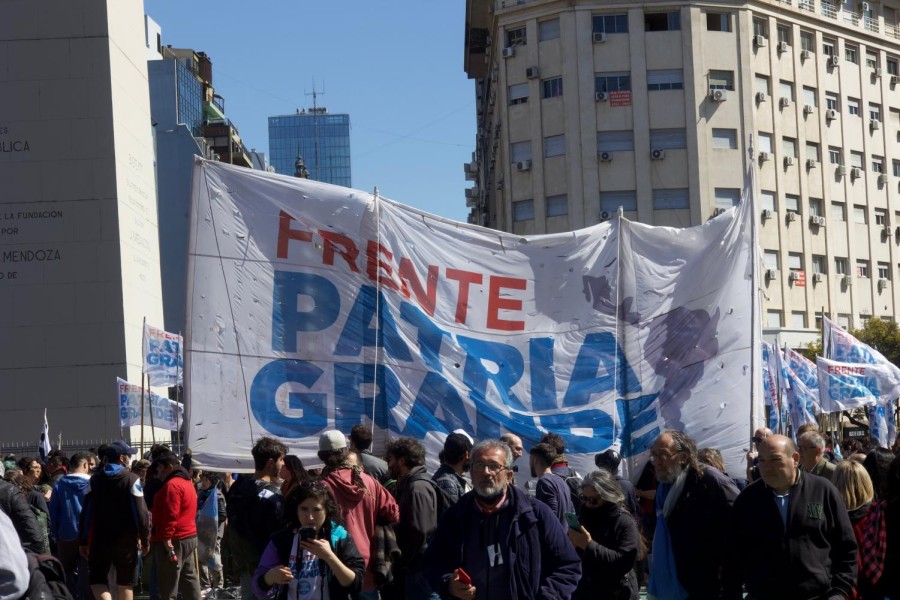In Buenos Aires, NYU students drawn into a national reckoning
Discourse about the preservation of democracy and the necessity of student interventions abroad surfaced after a failed assassination attempt on the Argentine vice president.
Protests broke out in Buenos Aires following a failed assassination attempt to take down Argentinian vice president Cristina Fernández de Kirchner. (Kris Yang for WSN)
September 16, 2022
On Sept. 1, a failed assassination attempt on Argentine vice president Cristina Fernández de Kirchner led to the prompt declaration of a national holiday by President Alberto Fernández. In an address to the country, he encouraged Argentine citizens to stand in solidarity with the vice president, the preservation of democracy and against the use of violence. The following day, demonstrations erupted on the streets of Buenos Aires.
Siegrid Tuttle, a junior in Gallatin, shared a digital flyer created by the Justicialist Party with other students at the Buenos Aires campus that read “Todas A Plaza de Mayo,” which translates to “Everyone to Plaza de Mayo.” By the afternoon of Sept. 2, several NYU students gathered in the city square alongside Argentines to denounce the assassination attempt and rally against a perceived threat to democracy — not even a week after their arrival in Buenos Aires.
That same day, Paula Di Marzo, NYU’s assistant director for Student Life at the Buenos Aires campus, sent an email to students warning them that it was strongly recommended to stay at home and avoid the demonstrations.
Fernández de Kirchner, a left-wing figure who was characterized by The Economist as “polarising” earlier this month, has headed the Argentine political sphere for two decades. A poll published last month by the Universidad de San Andrés revealed that 70% of the population felt “very bad” to “somewhat bad” about the political image of Fernández de Kirchner.
Kris Yang, a CAS junior, said they don’t consider themselves to be political. They mainly attended the rally to capture the energy of the protests through photography and become more immersed in the cultural atmosphere of Buenos Aires, characterizing themselves as “an outsider trying to participate.”
Political polarization, however, is what fueled these demonstrations. Peronism, a political movement that was born from the ideologies of 20th-century Argentine ruler Juan Perón, united many on the day of the rallies. Fernández de Kirchner has often been linked to the Peronist movement, which fuses populism and nationalism.
When the crowd began singing “Marcha Peronist,” or “Peronist March,” Yang didn’t resonate with the crowd because of their lack of Argentine political knowledge and the language barrier. Even though they knew nothing about the vice president, it wasn’t until the packed crowd began chanting “Cristina Presidenta” that Yang broke their silence.
“You feel a surge of energy that devours you,” Yang said. “It’s different from feeling stuck ― instead, you’re feeling enchanted.”
Tisch senior Elijah Reyes, who attended the rally with his roommate, Chi-Ting Tsai, an NYU international student from Taiwan, had a similar experience. Initially, Reyes didn’t think it was prudent that they participated alongside Argentines.
“We’re new to the country, we’re visitors, so I thought we should stay out of it,” Reyes said.
By the time he and Tsai arrived, they felt as though they belonged.
The support for Fernández de Kirchner radiated outside of her home in the Recoleta neighborhood the night of the assassination attempt. She served as Argentina’s first elected president from 2007-2015, succeeding her late husband, Néstor Kirchner. Now, it is speculated that she may be a candidate for the presidency in 2023.
Although she has a passionate crowd, support for the vice president has tapered. Fernández de Kirchner is potentially facing up to 12 years in prison due to corruption allegations. Prosecutors have accused her of siphoning public funds to an acquaintance.
“Democracy is not taken for granted here,” Belén Méndez Elizalde, a philosophy student at the University of Buenos Aires, said. “I don’t want to take it for granted, at least.”
Méndez has spent much of their life as an activist for social movements, including LGBTQ+ rights. Despite not being affiliated with any political party in Argentina, she remembered that it was the Kirchner duo that led policy changes concerning gender identity, gay marriage and more. The attack on Fernández de Kirchner made Méndez recall a familiar shift in the social climate ― a rise of a violent right-wing narrative.
After learning that NYU Buenos Aires students attended the demonstration in solidarity with supporters of Argentine democracy, Méndez felt empowered by their support, believing that it is an inherent responsibility to stand up for what is right. They emphasized that the problem is much bigger than it seems to those staying temporarily, including students studying away, and that Argentine lives are at stake. Here, Méndez raised an important question about what it means to participate in demonstrations abroad, especially if that intervention clouds persistent activist efforts.
“If they were there, they show an important part of what being Argentinian means,” Méndez said. “If I was in the United States and something like that happened, I would protest. I would go. You can’t just stand by and watch things happen on social media.”
While demonstrations filled the city square, some skeptics steered away from the rallies, believing that the event was intentionally politicized to garner support for the current administration since the vice president is expected to run for president next term.
Yang, who had been warned by their mother back home to be careful while in Argentina, asked their host mom prior to leaving on Friday whether she believed that these rallies against the use of violence were non-political demonstrations.
Yang’s Argentine host mom, who has asked to remain anonymous, laughed at their question and, inevitably, affirmed the volatile nature of demonstrations in Argentina.
“No, everything is political,” she said.
Contact Sade Collier at [email protected].
























































































































































